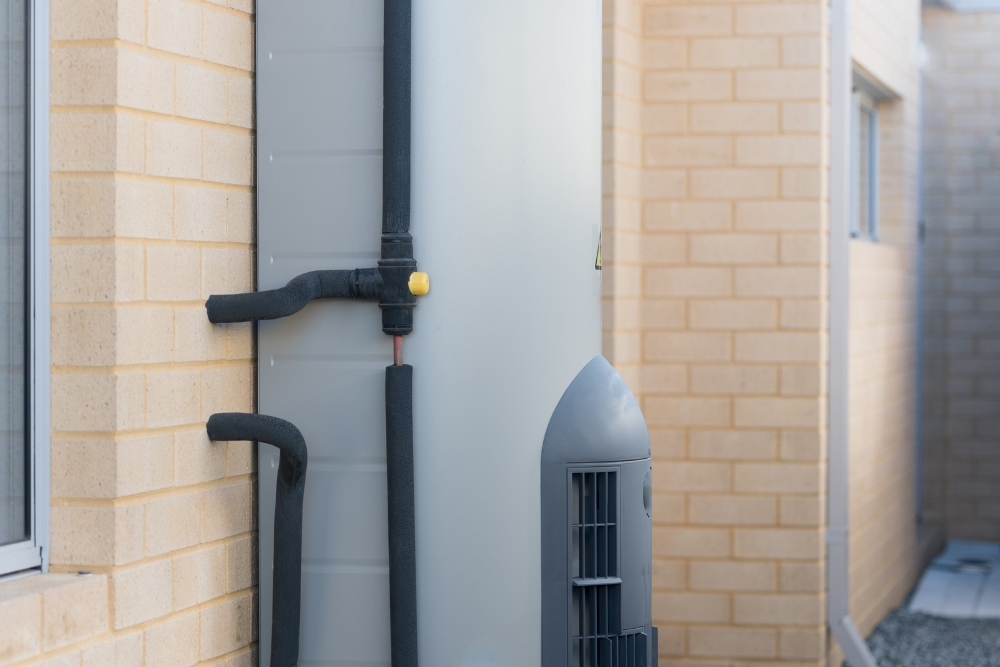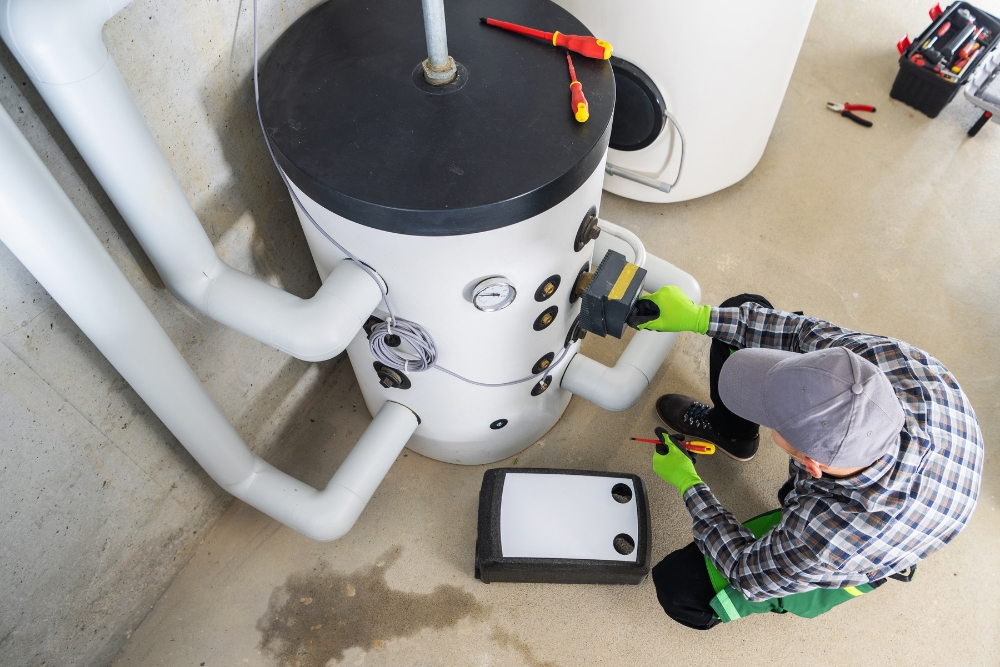Having a bit of a bother with your hot water because the expansion tank’s having a sook? Yeah, reckon we’ve all hit that snag at one point or another. After digging around for some decent fixes, we’ve cobbled together some top-notch tips for you.
This blog is going to walk you through whether it’s time to give your dodgy hot water service expansion tank the flick or just patch it up. We’ll cover the tell-tale signs something’s gone pear-shaped, chuck in some upkeep advice and sort out how to tackle common gremlins.
Key Takeaways
- Regularly check for signs of leaks, unusual noises, and water pressure problems in your hot water system’s expansion tank. These could indicate it’s time to repair or replace the tank.
- Professional plumbers play a crucial role in inspecting, maintaining, and fixing issues with expansion tanks. Rely on their expertise for proper installation and troubleshooting.
- Keep an eye out for corrosion, excessive leaking, and structural wear on the expansion tank. These are clear signals that replacement might be necessary to ensure your hot water system operates safely and efficiently.
- Conduct maintenance checks including clearing sediment buildup and ensuring there is sufficient air in diaphragm tanks to avoid common problems like low water output or noisy pipes.
- Expansion tanks have a lifespan of 5 to 10 years; however, regular inspections and minor repairs can significantly extend this timeframe. Stay proactive about maintenance to prevent unexpected failures.

Signs of a Faulty Expansion Tank
Listen for unusual noises or observe leaking around the expansion tank, as these could indicate a fault. If you experience water pressure issues or notice low hot water output, your expansion tank may be at fault.
Unusual noises
We often hear homeowners tell us about strange sounds coming from their hot water systems. These unusual noises might resemble banging, hissing, or popping and are key signs of a faulty expansion tank.
Such sounds shouldn’t be ignored as they indicate the system is under stress, possibly due to an airlock or excessive pressure build-up in the tank.
Taking action early can prevent more serious issues down the track. If your heating system starts making these odd sounds, it’s crucial to inspect the expansion vessel for any signs of failure.
We usually find that a good maintenance check and possibly venting water or fixing an airlock resolves these noise complaints efficiently. It’s all part of keeping your water supply running smoothly and avoiding bigger troubles with your plumbing services.
Leaking
If you notice a leaking expansion tank, it can lead to serious issues such as excess water pressure and potential damage to the hot water service. The dangers of a leaking expansion tank should not be overlooked, as unaddressed leaks can cause further complications within the system.
Promptly seeking professional assistance for repairing or replacing a leaking expansion tank is crucial in maintaining the reliability and safety of your hot water service. Regular maintenance and monitoring for signs of wear and tear are essential in avoiding the risks associated with a leaking expansion tank.
To address an expanding problem like this, it’s important to understand that symptoms of expansion tank failure, such as leaking, low water pressure, unusual noises, and rusty components serve as signs that action may be needed.
Water pressure issues
Experiencing water pressure problems in your hot water system can be a sign of a faulty expansion tank. Low hot water pressure may indicate that the tank is not functioning properly, potentially due to corrosion or excessive buildup.
If you notice reduced water pressure when using hot water, it’s essential to have a professional plumber inspect the expansion tank for any damage or leaks. Addressing these issues promptly can help prevent further damage to your hot water system and ensure consistent water pressure throughout your home.
If left unattended, low hot water pressure caused by an expansion tank issue can lead to inadequate performance of your entire hot water service. This could result in inconvenience and compromise the functionality of your daily routines.
Low hot water output or no hot water at all
Transitioning from water pressure issues to low hot water output or no hot water at all, it is important to address these signs as potential indicators of a faulty expansion tank. If you notice significantly diminished hot water flow or no hot water at all, this could be due to the malfunctioning of your hot water service expansion tank.
These symptoms can disrupt your daily routines and need immediate attention.
Excessive pressure buildup
If your hot water system has been experiencing low water output or no hot water at all, it could result in excessive pressure buildup within the expansion tank. This increased pressure can lead to potential leaks, unusual noises, and strain on the entire system.
It’s crucial to address this problem promptly as excess pressure can impact the performance and safety of your hot water service.
To alleviate excessive pressure buildup in your hot water system expansion tank, a professional plumber should be contacted to assess the situation thoroughly. Ignoring or neglecting this issue may lead to further complications and potential damage to your hot water service.
Reasons to Repair an Expansion Tank
Repairing an expansion tank is necessary when there are no leaks, corrosion is minor, and the damage is minimal. Clearwater lines and low pressure also point to reasons for repair.
No leaks
When it comes to hot water service expansion tanks, the absence of leaks is a crucial indicator of their functionality. It’s essential for homeowners to regularly check for any signs of leakage from the tank or its connections to ensure there are no potential issues with excess water pressure or compromised structural integrity.
Timely detection and addressing of any leaks can prevent further damage and maintain the efficient operation of the hot water system.
If you notice no leaks in your expansion tank, it indicates that the tank is effectively holding and releasing excess pressure without any compromising issues. Regular monitoring for leaks is important as part of maintenance to avoid potential hazards associated with leaking expansion tanks, such as increased water pressure or low hot water output.
No corrosion
No corrosion in the expansion tank means that there are no rusted or deteriorated components, which is a positive sign for its structural integrity. It indicates that the tank is less likely to develop leaks and will continue to function effectively without causing water quality issues.
Homeowners should regularly inspect their expansion tanks for any signs of corrosion to ensure they can address potential problems proactively.
Furthermore, a lack of corrosion also suggests a longer lifespan for the expansion tank, reducing the need for immediate replacement or repairs. Regular maintenance by professional plumbers can help prevent corrosion and prolong the functionality of the hot water service expansion tank, saving homeowners time and money in the long run.
Minor damage
If the expansion tank has minor damage, such as small leaks or low water pressure, it can often be repaired by a professional plumber. It’s essential to address these issues promptly to prevent them from escalating into more significant problems that could affect the efficiency and safety of your hot water service.
Regular maintenance and inspection can help identify and rectify minor damage before it becomes a major concern.
When faced with minor damage, homeowners should consult with a professional plumber to assess the situation and determine whether repair is sufficient or if replacement may be necessary in the near future.
Clearwater lines
To maintain a properly functioning hot water service, it is essential to ensure clear water lines within the expansion tank. When sediment and debris accumulate in the tank, it can lead to potential blockages and reduced effectiveness.
This may result in lower water pressure or unusual noises from the system. Regularly monitoring and maintaining clear water lines will help prevent these issues, ensuring optimal performance of the hot water service.
Proper maintenance of your expansion tank includes checking for corrosion and sediment buildup to keep your water lines clear. Over time, this proactive approach can help avoid costly repairs associated with clogged or blocked water lines in your hot water system.
Low pressure
If your hot water system is experiencing low pressure, it may be a sign of issues with the expansion tank. Low pressure can lead to reduced hot water output and affect the overall performance of your system.
Symptoms such as dripping from the valve or excess noise could indicate an underlying problem with the expansion tank. It’s crucial to have a professional plumber inspect and address these issues promptly to ensure the efficient and safe operation of your hot water service.
An expansion tank with low pressure could result in inadequate water flow throughout your home, impacting daily activities like showering and dishwashing. If you notice consistent low pressure, it could be a signal that there are potential problems within your expansion tank that require attention.
Reasons to Replace an Expansion Tank
When an expansion tank shows extensive corrosion or brittle connections, it can compromise the entire hot water system. Excessive leaking and overall structural wear are also compelling reasons to consider replacing the expansion tank.
Extensive corrosion
Extensive corrosion on your hot water service expansion tank indicates significant wear and tear. Corrosion weakens the tank’s structure, leading to potential leaks and safety hazards.

Identifying extensive corrosion is crucial as it may lead to increased pressure, compromised connections, and reduced lifespan of the tank.
Regular inspection for signs of corrosion is essential in maintaining the efficiency and longevity of the expansion tank. If you notice extensive corrosion, it’s important to consult a professional plumber who can assess whether repair or replacement is necessary to ensure the continued safe operation of your hot water system.
Brittle connections
If expansion tank connections become brittle, they can weaken and crack over time. This can lead to leaks and reduced effectiveness in regulating water pressure. It’s essential to monitor the condition of these connections regularly to ensure they remain strong and intact.
Leaking or deteriorating expansion tank connections can compromise the overall integrity of the hot water system, leading to potential safety hazards and decreased performance. Regular inspection by a professional plumber is crucial for identifying any issues related to brittle connections and taking prompt action to repair or replace them as needed.
Excessive leaking
Excessive leaking from your hot water service expansion tank can be a concerning issue, potentially leading to water damage and increased pressure in the system. This could result in safety hazards and potential long-term damage to your hot water system.
Signs of excessive leaking should prompt immediate action to prevent further complications and expenses related to repairs or replacements.
Regularly inspecting for signs of excessive leakage, such as dripping from the valve or other components, is crucial for maintaining the proper functioning of your hot water service.
Bent valves
If you notice bent valves in your hot water system’s expansion tank, it is a clear sign of structural wear and potential damage. Bent valves can lead to leaks, excessive pressure issues, and restricted water flow within the tank.
When encountering this issue, it is crucial to seek professional assistance promptly to assess whether repair or replacement of the expansion tank is necessary.
Bent valves can compromise the effectiveness and safety of the entire hot water service, leading to potential leaks and pressure-related problems. To ensure the continued efficient operation of your hot water system, addressing bent valves promptly is essential for maintaining reliable performance and preventing further damage.
Overall structural wear
Expansion tanks with overall structural wear may present as brittle connections, extensive corrosion, or bent valves. These issues can compromise the performance and safety of your hot water system.
Rusty components could signify erosion within the tank, potentially leading to leaks and decreased efficiency over time. Addressing these signs promptly is essential to prevent further damage and ensure the smooth operation of your hot water service.
Regular visual inspections for any signs of wear such as rust or corrosion on the expansion tank’s components are crucial in maintaining its structural integrity. Any visible damage should prompt consideration for repair or replacement to avoid potential hazards.
Sediment buildup
Sediment buildup in a hot water service expansion tank can lead to various issues, including reduced efficiency and potential damage. Sediment, such as mineral deposits or rust particles, accumulates over time at the bottom of the tank and can cause clogging within the system.
This accumulation restricts the flow of water and may lead to increased pressure, which could result in leaks or burst pipes. Addressing sediment buildup is essential for maintaining optimal performance and preventing costly repairs or replacements.
Regular maintenance by flushing out the sediment from the expansion tank can help alleviate these issues. It’s important for homeowners to be aware of this potential problem and consider scheduling routine inspections with a professional plumber to ensure that sediment buildup is effectively managed.
Taking proactive steps to mitigate sediment accumulation will contribute to the longevity and reliability of your hot water service.
Troubleshooting Common Expansion Tank Problems
If you notice venting water, check for a possible cause like an overfilled tank or excessive pressure. If your expansion tank needs recharging, turn off the power to the water heater and follow the manufacturer’s instructions carefully.
Venting water
If you notice your expansion tank venting water, it could be a sign of excess pressure or a malfunction. This issue can lead to leakage and potential damage to your hot water system.
Contacting a professional plumber is essential to assess the problem and determine whether repair or replacement is necessary. Ignoring venting water from the expansion tank may result in further complications, such as low hot water output and increased wear on the entire system.
Regular monitoring for signs of venting water is crucial for maintaining a safe and efficient hot water service.
Blocked air
If you notice gurgling or popping sounds coming from the hot water tank, it could be due to blocked air in the expansion tank. A professional plumber can troubleshoot and resolve this issue by releasing any trapped air from the system.
Blocked air can lead to inconsistent water pressure and reduced hot water output, affecting the overall performance of your hot water service. Addressing this problem promptly ensures that your system operates efficiently and effectively.
Tank needs recharging
If you notice that your hot water service expansion tank is not functioning correctly, it might be due to the need for recharging. Over time, expansion tanks can lose their air cushion inside, causing them to become less effective in regulating water pressure.
This issue can lead to problems such as excess pressure, unusual noises, and even leaking from the valve. To address this, it’s essential to have a professional plumber inspect the tank and recharge it if necessary.
By maintaining proper air pressure within the tank, you can ensure that it continues to function effectively and prevent potential issues with your hot water system.
Regular maintenance and monitoring of the expansion tank’s air cushion are crucial in avoiding issues related to low or high water pressure. If left unchecked, an undercharged expansion tank may result in reduced efficiency of your hot water service and could potentially lead to more significant problems down the line.
Insufficient air in the diaphragm tank
If there is insufficient air in the diaphragm tank, it can lead to water hammer or noisy pipes when using hot water. This issue may also cause fluctuations in water pressure and potentially damage the hot water service system.
Monitoring the air level in the diaphragm tank and ensuring it is at an appropriate level will help maintain the proper functioning of your hot water service.
Regular checks on the air levels within your diaphragm tank are essential to prevent issues such as excess pressure, unusual noises, and potential system damage. A professional plumber can assist with inspecting and adjusting the air levels in the diaphragm tank, ensuring that your hot water service operates efficiently and safely.
Condensation on tank
Condensation on the expansion tank might indicate an issue with excessive pressure or temperature fluctuations within the hot water system. Check for any visible signs of rust, dripping, or sweating on the tank surface which could signal potential problems.
Contact a professional plumber to inspect and address condensation issues promptly to prevent further damage.
Keep an eye out for any sudden changes in your hot water system and seek professional advice if you notice condensation on the expansion tank. Regular maintenance can help identify and resolve problems early while ensuring the continued safe operation of your hot water service.

Cost and Maintenance of Expansion Tanks
Maintaining expansion tanks is crucial for uninterrupted hot water supply. Regular inspection and minor repairs extend the average lifespan of an expansion tank significantly. Hiring a professional plumber ensures proper installation, maintenance, and cost-effective solutions for any issues that may arise.
Average lifespan
Expansion tanks for hot water systems typically have an average lifespan of 5 to 10 years. This timeframe may vary based on factors such as water quality, usage patterns, and maintenance practices.
Regular inspection and maintenance can help prolong the lifespan of the expansion tank, ensuring efficient performance and minimising the risk of unexpected failures.
To ensure the optimal functioning of your hot water service expansion tank, it’s essential to be aware of its typical lifespan and consider scheduling regular inspections with a qualified plumber to assess its condition.
A proactive approach to monitoring the expansion tank’s performance can prevent potential issues down the line, ultimately contributing to a reliable hot water system.
Maintenance and inspection
To keep the expansion tank in good working condition, it’s important to perform regular maintenance and inspections. Here are the key things to consider:
- Check for any signs of leaks, corrosion, or rust on the tank itself, as well as on any connections or valves.
- Inspect the pressure relief valve for proper functioning and ensure that it is not stuck or blocked.
- Test the air cushion in diaphragm tanks to ensure it is at the right pressure level for optimal performance.
- Monitor for any unusual noises coming from the expansion tank, which could indicate an issue that needs attention.
- Schedule periodic professional inspections to identify any potential problems early on and address them promptly.
Regular maintenance and inspections are essential to ensure the efficient and safe operation of your hot water system. By staying proactive with these tasks, you can avoid major issues and costly repairs down the line.
Cost of replacement
Replacing a faulty expansion tank in your hot water system can cost between £200 and £600, depending on the size and type of tank needed. The overall expense includes the price of the expansion tank itself, plus labour costs for installation by a licensed plumber.
To minimise future expenses, it’s essential to address any signs of wear or damage promptly before they escalate into larger problems.
An ageing or damaged expansion tank will eventually need replacement, which is an investment worth considering to ensure the efficient functioning of your hot water service system.
Alternatives to expansion tanks
If you’re looking for an alternative to traditional expansion tanks, consider the SharkBite Thermal Expansion Relief Valve. This valve is designed to absorb thermal expansion in a hot water system and prevent excessive pressure buildup.
It features a compact design and can be easily installed on the cold-water inlet line of the water heater. The relief valve provides a cost-effective solution to address expansion-related issues and ensure a continuous supply of hot water without the need for a conventional expansion tank.
To tackle hot water service expansion tank problems effectively, it’s essential to explore viable alternatives such as the SharkBite Thermal Expansion Relief Valve. This alternative offers homeowners peace of mind by mitigating thermal expansion and safeguarding against potential pressure-related concerns in their hot water systems.
Importance of hiring a professional plumber
When dealing with issues related to expansion tanks in your hot water service, it is crucial to consider the expertise of a professional plumber. An experienced plumber can accurately assess the symptoms of expansion tank failure, such as excessive pressure or unusual noises, and provide efficient solutions.
Addressing expansion tank problems promptly ensures the safe and uninterrupted operation of your hot water system, reducing the risk of potential hazards associated with leaks or high pressure.
Professional plumbers have the necessary skills and knowledge to troubleshoot common expansion tank problems, including venting water or airlock issues. They can also determine whether repair or replacement is needed based on factors like corrosion, leaking, and low water pressure.
Efficient Hot Water Solutions for Your Comfort Today!
Upon detecting signs of a faulty expansion tank, it’s crucial to take action promptly. Whether it’s repair or replacement, addressing the issue ensures a reliable hot water system.
Leaking and pressure problems can pose risks, making regular maintenance vital. With professional assistance, maintaining the expansion tank safeguards your home’s hot water service for continued safety and efficiency.
Don’t let a faulty expansion tank disrupt your hot water supply. Contact us now to repair or replace your expansion tank and ensure the optimal performance of your hot water system.






